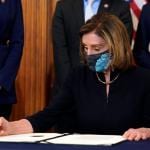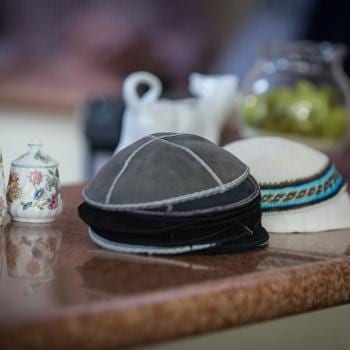The Vision, pp. 261-266
So. Magdalene calls her father—his name, we’re told, is Mr. Giles—and this phone call is just the worst thing I’ve ever read.
“I’m doing really good, Daddy! I’ve missed you so much. Daddy, I am so sorry for not obeying you … and Daddy? I got saved and am walking in truth and have lots of good friends that love the Lord and are busy sharing the gospel over the whole earth.
“God has been so good to me, Daddy. I’m so thankful. I wanted you and Mama to know that I am doing good and that I love you and I am so sorry for not being a good daughter to you. How’s Mama and the kids? I miss them so much!”
What the what what now??
Magdalene’s father was a terrible father. Her home was dysfunctional and abusive. While I understand that people who grow up in terrible situations often still crave their parents love—we seem to be wired that way—the apologies for being a bad daughter and for disobeying are not cool.
Maybe this is coming from inside of Magdalene, in which case the people around her need to tell her that the voice in her head is wrong—that she was right to flee an abusive situation (her father was trying to force her to have an abortion against her will because the guy she’d been with was Black), and that what happened to her was not her fault (she was conned by her brother into attending a drug-laced party, and was vulnerable to this invitation because her home life was completely dysfunctional).
It’s also possible, of course, that Magdalene is getting these messages from the others at TLP. It’s possible that Omar and Tess, or Cheyenne or Hope or someone, has been working to convince her that she did wrong by not being a proper obedient daughter, and that if she’d only been good enough her parents and home life would not have been dysfunctional. This is all a lie.
I feel the need to remind readers that Magdalene was homeschooled. She had no school friends, or teachers, or friends parents that could have helped her, or could have offered her a respite from her dysfunctional home. She was almost certainly saddled with a large amount of childcare and responsibilities in the home, as the oldest daughter in a large homeschooling family (I think she said there were nine kids?). And being homeschooled cut her off from any hope of a support network not controlled by her parents.
Also, she received only a very limited education, so this wasn’t even a case where she could just hold on til graduation and then she’d have options. She had no options. That’s why she ended up on the street.
None of this was her fault.
And yet—and yet we get this phone call.
“Baby, it’s been a long, long time. We didn’t even know if you were dead or alive. Where have you been all this time? Did those people keep you from calling us?”
A look of dread settled over Magdalene’s young countenance. She had explained her father’s paranoia to those listening in the next room. It had been this way ever since he had become involved with the White Supremacists.
This is actually not a terrible question, albeit badly phrased. If one of my kids ran away as a teen and then called me after they’d been missing for a year I would definitely start out by asking if they are safe. Runaways are at high risk of violence and trafficking. They are extremely vulnerable to harm.
And I’d probably also want to know why my kid hadn’t called me earlier to let me know they were alright, although I would probably wait to ask that sometime later, after I was sure they were safe.
Back to Magdalene:
Magdalene’s voice carried panic and frustration as she answered him. “No, Daddy! Don’t be crazy! They begged me to call, but … I don’t know … I was just scared you wouldn’t forgive me or something. Oh Daddy, please forgive me.”
This is so terribly, profoundly sad.
In the hands of another writer, I’d assume that the point is to highlight Magdalene’s unmerited sense of guilt—and that the other characters, as I read on, will talk Magdalene through some of this and help her see that it’s not her fault. But we are not in that book. We are in Debi’s book.
Magdalene goes on, telling her father about her life on the streets, about being kidnapped, about surviving and being brought to live with Cheyenne and the others.
“Oh, Daddy! I am so thankful! Jesus has forgiven all my sins. I am saved, Daddy! I am really, really saved.”
There was a long silence. Mr. Giles asked, “Magdalene, what did you do with the … you were … did you get rid of the … Magdalene …” Her father cleared his throat then asked in a determined voice, “Magdalene, I would like to see you. But, if you come home, you will be coming alone?” It was understood. No half-breed would be welcomed.
Why is she even making this phone call?!
Magdalene’s father hasn’t changed a wit. That much is clear. Did Magdalene take time to sort through what she wants before making this call? Does she want to go home? She just switched from working with the Herb Den crew to working on the publishing side of the business because she wants to help share the gospel. Did she subsequently decide that she actually wants to go home, to North Carolina?
Omar and Tess seem to have spent the most time talking to Magdalene about this—they’re the ones who finally forced the issue on her calling her parents. Did they talk through the possible outcomes of this phone call with her? Do they think she should go home? It’s not like going home will mean getting back to school so that she can graduate with a diploma—she’s homeschooled and her parents aren’t exactly organized.
I could see Magdalene deciding that she needs to go home in order to witness to her parents, or, more realistically, in order to be there for her younger siblings, so that they’re not completely on their own. It makes sense that Magdalene would feel a keep sense of responsibility toward her younger siblings, especially since she would have helped raise them, taking over more and more of the parenting responsibilities as her parents retreated into their respective obsessions.
But see: none of this is ever stated. We don’t learn that Magdalene is worried about her siblings and wants to go back to help them. We don’t even learn that Magdalene feels guilty for leaving or that she wants her father’s forgiveness—those things come out of the blue during her phone call. There is no setup for any of this, no roadmap, no prep work or planning or talking through options. Just nothing but this phone call.
Magdalene’s face flushed. A sob caught in her throat. “I’ll be alone,” she responded flatly.
They all heard his sigh of relief, “Ha … that’s good. Well. Now I can plan how to get my girl back home. It has been a long time, Maggie. I still can’t believe someone didn’t keep you from calling me …? Something smells funny, Magdalene. I need to know, so don’t you lie to me. Are your new friends Arian or not?”
Magdalene hesitated for a moment, looking with frightened eyes through the glass at her friends for support. Dropping her eyes, she lied. “Yes.”
Asher knew her dad would guess that he was lying. He felt the cold grip of fear began to knot up in his stomach. “Lord, help us.”
The eff is going on here??
This is the point, in movies, where someone pulls the phone call out of the wall to end the call and ensure that her father won’t somehow trace it. Magdalene’s father is dangerous. Period.
“Daddy, I’ll just hop a bus or train. My friends said they would buy me a plane ticket, so you don’t need to come. I could be home in 3 days.”
Wait, when did this conversation happen? When, in the midst of Magdalene’s passionate declarations that she’s been called to work for TLP to help win Muslims with the gospel, did Magdalene decide to go home?
I feel like there’s a missing chapter to this book.
Mr. Giles interrupted her with urgency in his voice that made her know he still cared. “No, no … I’m coming to get you. Where are you anyway? The caller ID said you’re Tennessee? How in the thunder did you get all the way down to Tennessee?”
Magdalene looked at the group and smiled through her tears. This was the familiar, demanding, angry response that she was used to hearing. This was the daddy of her youth. In her best memories, he was always thundering this or that.
Okay but that’s not … great? That’s clear, right?
Magdalene’s father—Mr. Giles—tells her he’ll be there to get her Monday morning, because it will “take him several hours of driving.” Which. What? It’s Saturday evening. North Carolina and Tennessee touch each other. Even if you assume we’re talking the middle of one state to the middle of the other, we’re talking a drive of 6 or 7 hours. Mr. Giles could jump in the car right away and be there early Sunday morning.
This does not actually make sense.
“You have your stuff together, Maggie-girl, because I got to be back home for an important meeting Monday evening. It’s way too important for me to miss.
A look of fear passed over Magdalene’s face. Monday nights were reserved for the White Supremacist meetings.
He adds: “I’ll be there early Monday. You be ready. Don’t keep me waiting.”
Okay, but picking her up early Monday morning means driving overnight Sunday night. Why do that? Why wait all day Sunday, and then leave Sunday night? If Magdalene’s father wanted to drive overnight he might as well hop in the car right away, and get there early Sunday. It would make a lot more sense for him to leave Sunday morning, pick her up mid to late afternoon, and then drive home.
We’ll see shortly that this is all subterfuge: he’s going to drive in on Sunday to spy on Magdalene and her non-Arian friends. But I feel like someone would have picked up on this being odd? Also, it seems wrong to put Magdalene on the phone and no one else? Magdalene is just so dang vulnerable here. Why not put Malachi on the line at some point too, to give Magdalene’s dad some straight talk?
Magdalene’s “friends” are awful.
But Magdalene is somewhat oblivious to all of this because she’s still in the first glow of being saved and passionate for the gospel. She goes on and on bubbling over the phone to her dad about The Last Publishers ministry and the work they’re doing to convert Muslims, and how wonderful it all is.
And then we get this:
A cold chill ran through Asher has he listened to Mr. Giles’ carefully crafted questions. He recognized the direction he was going. In her naiveté and desire to see her family Magdalene told her daddy information which would enable him to know those among them who had Jewish roots. When he asked for The Last publishers website, there was nothing she could do but comply.
Really? There was nothing she could do but comply? No one could, I don’t know, pull the phone cord from the wall? Was there never any discussion about whether they should give a dangerous white supremacist their full info, location, everything?? This book’s title should be No One Thought This Through!
Magdalene lifted her small shoulders, smiling at the group who sat around the table, but her smile could not cover the anxiety that filled her soul, “Well, that’s it then. Daddy’s coming to get me. I have two days and then I will be going home.” She tried to grin. “But I’ll be back.”
She will? What’s the plan here?
You know what would have helped? Reading conversations between Magdalene and Tess where Tess talks her into feeling guilty and talks her into feeling obligated to return to her father, because from where I’m sitting, that’s the most realistic explanation for what’s happened here. No one told her to tell her father, not once, until we got to “Tess says I should,” and Cheyenne’s comment that “you sure are hanging out with Omar and Tess and their kids a lot” suggests they’ve gained an increasing influence over her.
Which is ironic, because Magdalene’s dad is going to try to burn Omar and Tess’s kids alive, and no I am not kidding, and no one will learn any lessons at all from this. Frankly, Asher’s brother shouldn’t let any of these people into his cave system turned volcano shelter because they’re extremely lax on security.
So! Magdalene’s daddy is a dangerous white supremacist and he is coming to pick her up and take her home, and she is happy because she believes she was a bad daughter and needs forgiveness!
Fun!
Ooo, section break, and then we turn to Mr. Giles.
Mr. Giles looked at the phone he held in his hands. Before he lay it down, eh hit a few buttons. His computer had been open and he had been reading The Last Publishers’ website as Magdalene talked.
A deep scowl covered his face when he saw Malachi’s name. “Filthy Jew, pretending to be a Christian.”
THIS BOOK IS SO WEIRD.
Exactly four pages ago Omar said “I can sure see why some folks don’t like Jews” and everyone was like, I mean, seems about right. If the bad guys in your book are the white supremacists, you probably shouldn’t have your good guys saying things like “I can sure see why some folks don’t like Jews” while everyone nods.
And then there’s this:
An even deeper scowl came over him when he looked through the pictures found under the Meet the Staff section. Omar and Tess with their children were front and center. Magdalene’s white hair looked like light as she huddled together among their children.
He whispered under his breath, “They’re using her, no doubt about that. She’s too young and dumb to realize the truth. Probably that African heathen is cooking something up for her right now, or worse than that, some lousy Jew. Well, I’ll be there by tomorrow wand then they’ll know that the hand of God will not tolerate them touching a clean white thing.”
How did no one see this coming? The man tried to make his daughter have an abortion against his will because the guy she’d been with was Black, and no one thought to wonder whether he’d be upset that some of the people she’s been living with are Black? Who okayed putting that picture on the website? Did they forget Magdalene was a runaway? A runaway from a dangerous white supremacist father?
Asher’s brother should definitely not include these people in his little project.
I’m going to leave off quoting and do some heavy summarizing. Magdalene’s mother walks into the room and asks her father about Magdalene—having overheard snippets of the phone call—and Magdalene’s father responds by threatening to hit her, at which Debi says “the broken woman” left the room.
They are sending Magdalene back to an abusive home.
What is this book even doing.
Magdalene’s father goes into his secret locked room and boots up his private computer and types in “a long list of secret codes” to locate other white supremacists in the area of Tennessee where The Last Publishers is located. I don’t think it works that way, but okay. He finds that the list is extensive, and includes lots of local officials, which has him laughing to himself happily. “We basically own that area of the world. Good.”
So he starts making phone calls. And he’s upset that Magdalene lied, claiming her new friends were Arian when in fact, the white supremacists he calls tell him they are engaged in a project “to purge the area of undesirables, some of which were The Last Publishers leaders.” No matter.
Mr. Giles pulled an attache from underneath the bed and quickly packed his bags, working from a mental list. “Let’s see … two extra clips—48 rounds should be enough to handle anything … my boot knife … wilderness survival kit just in case. That should do it.”
Cool. Cool cool cool.
Is anyone actually in charge of TLP? Malachi is, ostensibly, but did Omar talk to him before making Magdalene call her dad? This is a security risk. But even short of that, this is a risk to Magdalene. This poor child never had a real chance in her life, and now she’s going to end up dead.
I have a Patreon! Please support my writing!















